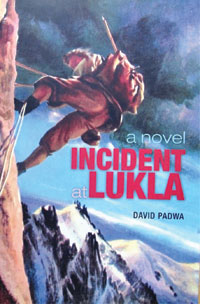This intriguing novel hits on several themes in recent and contemporary Nepalese life, society and politics. It is a well-hewn character study of several individuals caught up in intriguing and dramatic events and relationships. In no particular order, there is an American Peace Corps Volunteer and a Sherpa policeman, her lover. The volunteer spends most of her time living an adventurous life as a skilled trek and climbing guide (hardly what PCVs are assigned to do), with only brief reference to some village latrines she is promoting.
There’s also an aging Maoist commander who, given several brutal mistakes by his cadres, appears to be losing his faith and interest in the cause.
Another two main characters are 30-year career CIA agents who are seeking to lure two of the other characters in the book to the American side before they retire.
 Then there’s a complicated Chinese army officer character who is assigned to patrol and seal the Tibet/Nepal border from disgruntled Tibetans seeking freedom in Nepal. He plays two contradictory roles, including the smuggling of the viagra-like yarsagumba medicinal substance into China (which raises some questions, since the Chinese are the main out-in-the-open buyers of the ‘gumba’ as the author calls it).
Then there’s a complicated Chinese army officer character who is assigned to patrol and seal the Tibet/Nepal border from disgruntled Tibetans seeking freedom in Nepal. He plays two contradictory roles, including the smuggling of the viagra-like yarsagumba medicinal substance into China (which raises some questions, since the Chinese are the main out-in-the-open buyers of the ‘gumba’ as the author calls it).
To say more here would give too much of the convoluted plot away, but readers should know that the Dalai Lama and the Tengboche’s Gyalpo Rinpoche also play short parts in the story; and why not – they are significant personages who help anchor the plot in reality. One thing is sure, although it is often difficult to achieve in such a novel: the fictional characters are well developed and believable.
The novel takes place in several locations, although the Solu-Khumbu’s Lukla Airport is where the most of the startling “incident” of the book’s title takes place. There are other scenes including at the Maoist commander’s hideout, a visit to Biratnagar in the Nepal terai lowlands, and at the Tengboche monastery within view of Mount Everest.
If you read this book with little understanding of Nepal, it will likely peak your interest and come off as well done. It’s a reasonably smooth read, and fast, despite the increasing complexity of characters and plot. There is no question that the author is a talented writer.
If you know much about Nepal, however, several errors may interfere (as they did for me). A good copy-editor employed either by the author or the publisher would have helped correct the following unnecessary inaccuracies (which are inexcusable even given a novelist’s prerogative at writing fiction). There are these (and a few other) obviously mis-spelled words: ‘Ghurkha’ for Gurkha, ‘Bhiratnagar’ for Biratnagar, ‘Rasta Bank’ for Rastriya Bank, ‘Dankuta’ for Dhankuta, and ‘Pathan’ for Patan. Patan, of course, is the sister city to Kathmandu, while ‘Pathan’ is an Afghan tribal group. A quick look at a map would have cleared up these sorts of mistakes.
There is also a bit of historical mis-timing, such as referring to the old Panchayat system of government as coincident with the Maoist insurgency, when in fact they were at least a half decade apart. Among the socio-cultural mistakes is calling a shoe-maker by the surname ‘Joshi’, which in fact is a Khas-Brahmin and a Newar name far removed from the profession of shoe making. And, take another look at the hotel next to Boudhanath Stupa; it’s the Hyatt, not the Sheraton (which departed Nepal several decades ago).
These few niggling issues aside, David Padwa’s ‘Incident at Lukla’ reads well and otherwise rings true with its exotic, and sometimes erotic, plot
Do I recommend it? Yes, despite my mildly critical assessment. It is fun to read, trying to guess what happens next and sometime being entirely fooled by the author. Combining good character development with elements of suspense and surprise are some of the hallmarks of good novel writing. We’ll look for more from David Padwa.
Vajra Publications (Jyatha/Thamel, Kathmandu), 2013; 305 pages; www.vajrabooks.com.











